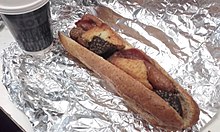
Summary
The breakfast roll (Irish: rollóg bhricfeasta, [ˈɾˠoːl̪ˠoːɡ ˈvʲɾʲɪcˌfʲasˠt̪ˠə]) is a bread roll filled with elements of a traditional fried breakfast. It is served at a wide variety of convenience shops, newsagents, supermarkets, petrol stations, and casual eateries throughout Ireland.[4][5][6][7]
 Irish breakfast roll | |||||||
| Alternative names | Full Irish breakfast roll | ||||||
|---|---|---|---|---|---|---|---|
| Type | Sandwich | ||||||
| Course | Breakfast or snack | ||||||
| Region or state | Ireland[1] | ||||||
| Main ingredients | Bread roll; filling, such as sausages, bacon, white or black pudding, egg, hash brown, butter, mushrooms, tomatoes; tomato sauce or brown sauce | ||||||
| Variations | Baguettes, sliced bread | ||||||
| ~1,200[2] kcal | |||||||
| |||||||
| Similar dishes | Chicken fillet roll | ||||||
| |||||||
Recipe edit
A breakfast roll typically consists of a bread roll or baguette containing one or more fillings such as sausages, bacon, white or black pudding, butter, mushrooms, tomatoes and tomato sauce or brown sauce.[8] In some cases a hash brown or fried egg may be added; these fillings vary between cooks and restaurants. The roll itself is usually one of three varieties: a soft "submarine"-type roll, a chunky, spherical dinner roll or a demi-baguette. The demi-baguettes are distributed to shops partially baked and frozen, allowing stores to quickly bake the bread for a "freshly baked" roll. An "all-day breakfast" sandwich featuring some or all of the above ingredients in a traditional sandwich of sliced bread may be used instead.[citation needed]
Popular culture edit
The popularity of the breakfast roll (and novelty songs) in Ireland led to the song "Jumbo Breakfast Roll" by comedian Pat Shortt, which reached number one in the Irish music charts and remained there for six weeks.[9] The song was number 11 on the Irish chart list of best-selling songs of the 2000s.[10]
It has been argued that the breakfast roll became a national dish in Ireland during the Celtic Tiger economic boom of the 1990s and 2000s,[11] becoming synonymous with "Breakfast Roll Man", the archetypal sub-contractor who was busy with construction work and needed sustenance on the move, before the bursting of the Irish property bubble in the late 2000s.[12]
See also edit
References edit
- ^ "Breakfast baguette rolls into Irish history". Belfast Telegraph. 8 July 2008. Retrieved 16 June 2022.
- ^ "How many calories in a breakfast roll". boards.ie. 24 November 2007. Retrieved 17 December 2022.
- ^ "How many calories in a breakfast roll". boards.ie. 24 November 2007. Retrieved 17 December 2022.
- ^ McWilliams, David (22 October 2009). David McWilliams' Follow the Money: David McWilliams Ireland 2. Gill & Macmillan Ltd. ISBN 9780717155576 – via Google Books.
- ^ Anderson, Heather Arndt (11 July 2013). Breakfast: A History. AltaMira Press. ISBN 9780759121652 – via Google Books.
- ^ McWilliams, David (11 January 2011). The Pope's Children: The Irish Economic Triumph and the Rise of Ireland's New Elite. John Wiley & Sons. ISBN 9781118045374 – via Google Books.
- ^ "Centra Westland Row restaurant menu in Dublin 2 - Order from Just Eat". Just Eat. Retrieved 2022-12-17.
- ^ Bergin-Holly, Dan (February 13, 2018). "The Irish Breakfast Roll Will Save Your Soul". MyRecipes. Retrieved 2022-12-17.
- ^ "8 songs that topped the Irish charts (that you may have forgotten)". Retrieved 31 July 2017.
- ^ Jan Battles (10 January 2010). "Six makes hit of the decade". The Sunday Times. News International. Retrieved 10 January 2010.
It also shows the popularity of novelty comedy songs, which the Irish public always appear to have a bit of a thing for, such as Jumbo Breakfast Roll by Pat Shortt at number 11.
- ^ McDonald, Brian (12 May 2008). "Top breakfast baguette rolls into Irish history". Irish Independent. Retrieved 3 February 2019.
- ^ Share, Perry (20 May 2011). "The Rise and Fall of the Jumbo Breakfast Roll: How a Sandwich Survived the Decline of the Irish Economy". Sociological Research Online. 16 (2): 143–149. doi:10.5153/sro.2289. S2CID 56444734. Archived from the original on 17 September 2014. Retrieved 16 September 2014.


